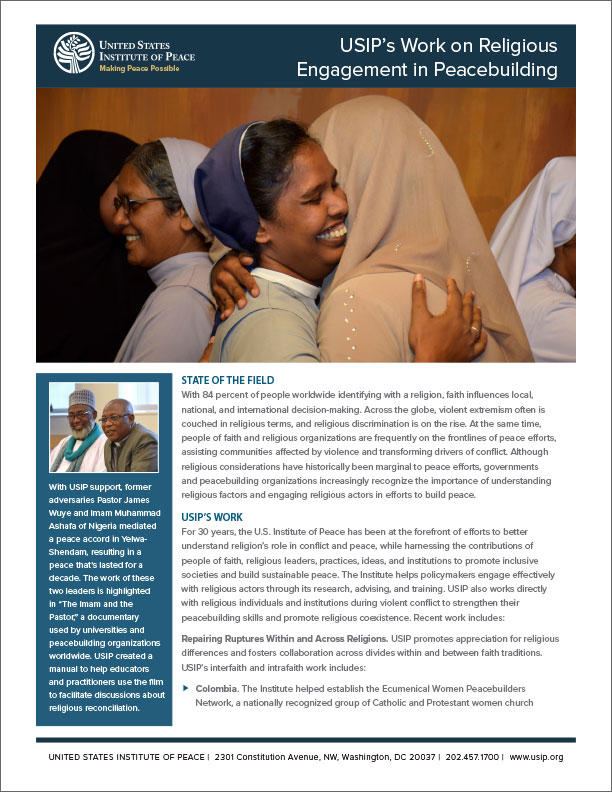A USIP Fact Sheet
With 84 percent of people worldwide identifying with a religion, faith influences local, national, and international decision-making. Across the globe, violent extremism often is couched in religious terms, and religious discrimination is on the rise. At the same time, people of faith and religious organizations frequently are on the frontlines of peace efforts, assisting communities affected by violence. Although religious considerations have been marginal to peace efforts historically, governments and peacebuilding organizations increasingly recognize the importance of religion.
USIP’S Work
For 30 years, the U.S. Institute of Peace has been at the forefront of efforts to better understand religion’s role in conflict and peace, while harnessing the contributions of people of faith, religious leaders, practices, ideas, and institutions to promote inclusive societies and build sustainable peace. The Institute helps policymakers engage effectively with religious actors through its research, advising, and training. USIP also works directly with religious individuals and institutions during violent conflict to strengthen their peacebuilding skills and promote religious coexistence. Recent work includes:
Repairing Ruptures Within and Across Religions
USIP promotes appreciation for religious differences and fosters collaboration across divides within and between faith traditions. USIP’s interfaith and intrafaith work includes:
Colombia. The Institute helped establish the Ecumenical Women Peacebuilders Network, a nationally recognized group of Catholic and Protestant women church leaders who advocated locally for the 2016 peace accords. Now they help foster reconciliation as former combatants return home.
Iraq. USIP trained civil society facilitators in religious peacebuilding and supported them in implementing a series of local projects, including peace courses at sharia colleges and community discussions on religious violence and reconciliation.
Pakistan. USIP partnered with the Renaissance Foundation for Social Innovation to organize dialogues across 20 university campuses about interreligious and intrareligious violence and radicalization.
Sri Lanka. The Institute worked with the Centre for Peacebuilding and Reconciliation (CPBR) to form a coalition of 200 male and female faith leaders from Buddhism, Hinduism, Christianity, and Islam who mitigate local conflicts. Following the 2019 Easter bombing, CPBR is fostering local interfaith reconciliation with USIP support.
Researching Religion’s Influence and Shaping Policy
Through its on-the-ground research with local partners, USIP strengthens understanding of how religious ideas, practices, actors, and institutions influence both conflict and peace. Recent efforts include a global research project to examine the impact of religious actors in official peace processes.
USIP’s Mapping the Religious Landscape in Conflict-Affected States project is a unique methodology for peace practitioners to track and analyze the impact of religion. Mapping has been completed or is underway in Libya, South Sudan, Iraq, Rakhine State in Burma, and Ukraine. In addition to providing concrete data, this research helps policymakers determine the best approaches for establishing secure, sustainable peace.
Similarly, USIP’s Religion and Countering Violent Extremism Practitioners’ Exchange has explored the complex relationship between religion and violent extremist movements around the world. Convening policymakers, scholars, and practitioners from diverse settings, this series of global symposia has resulted in policy recommendations for those seeking to partner with religious actors in efforts to build resilience, promote reconcilation, and prevent and counter violent extremism.
Developing Practical Resources for Training and Educating
USIP, with partners, is developing a series of action guides focused on religion and conflict analysis, mediation, reconciliation, and gender-inclusive religious peacebuilding. USIP’s “Introduction to Religion and Peacebuilding” online micro-course offers an overview of the religious peacebuilding field; exploring the role religion plays in driving both peace and conflict and how best to engage the religious sector in peacebuilding activities.
The Institute also works with religious education centers to build knowledge, skills, and confidence in conflict prevention, mediation, and reconciliation. In Burma, Indonesia, Iraq, Nigeria, and Pakistan, USIP has supported peace studies curricula that resonate with local cultural and religious practices to ensure that the next generation of religious leaders are prepared to build peace.
|
Examining Women’s Roles in Religious Peacebuilding |
|
Religious peacebuilding efforts have too often focused on male clerics while marginalizing or ignoring religious women who are actively building peace, often at the front lines of violence. USIP’s Women, Religion, and Peace Initiative—conducted with the Berkley Center for Religion, Peace, and World Affairs and the World Faiths Development Dialogue—highlights the peace efforts of women religious leaders and the role of religion in empowering women peacebuilders. In 2015, the initiative produced an anthology of case studies that highlight the challenges and contributions of women religious leaders to peace worldwide. Building on this anthology, USIP’s Religious Women on the Frontlines of Violence project investigates how religious women leaders have successfully negotiated with armed groups in the midst of violent conflict. Some of their stories are documented in a blog series on USIP’s website. |
